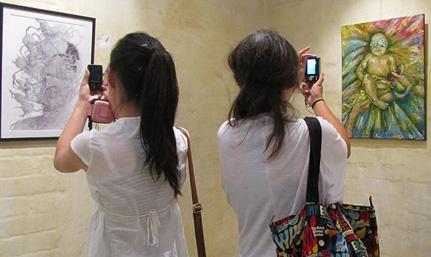|
 |
|
Learners from Ferrum High School in Newcastle, KwaZulu-Natal, admiring the artworks at the Centenary gallery.
Photo: Linda Fekisi
24 March 2013 |
Four artworks by Kovsie students have been selected for the 2013 Absa L’Atelier Awards. The artworks will form part of the national Absa L’Atelier exhibition later this year, which will be held at the Absa Gallery in Johannesburg.
Mandi Bezuidenhout, Louis Kruger and Johannes Botma, all master’s students in Fine Arts, have been selected as finalists for the central region of the prestigious competition.Two artworks of Louis, and one each of Mandi and Johannes, have been selected for the awards. Pauline Gutter, a former Kovsie student, has also been selected as finalist for the central region.
The Absa L’Atelier is South Africa’s most prestigious art competition and is held annually for artists between the ages of 21 and 35. This award not only ensures recognition for South Africa’s emerging artists, but also affords them the opportunity to develop their talents abroad. The winner of last year’s competition, Elrie Joubert, graduated with a master’s in Fine Arts from the UFS in 2010.
Four prizes are available in 2013’s competition. The first prize consists of R125 000 and a residency at the Cité Internationale des Arts in Paris. An Apersand Foundation Residency in New York City and a Sylt Foundation Residency on the Island of Sylt, Germany, will be granted through two merit awards. The most promising artist will receive the Gerard Sekoto Award of R80 000, as well as a residency at the Cité Internationale des Arts in Paris.
The Absa L’Atelier art competition is run in conjunction with the South African National Association for the Visual Arts (SANAVA).
An exhibition of artworks from the central region is currently on display at the Centenary Gallery, upstairs in the Centenary Complex, until 28 March 2013. The gallery will be open on 20, 25, 26, 27, and 28 March from 10:00 to 15:00.